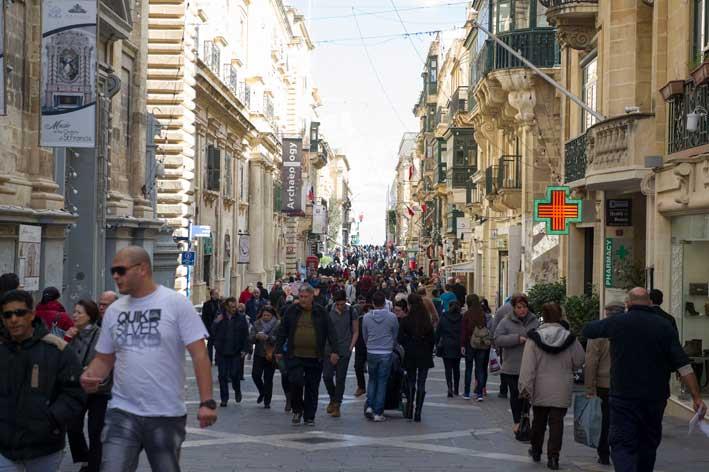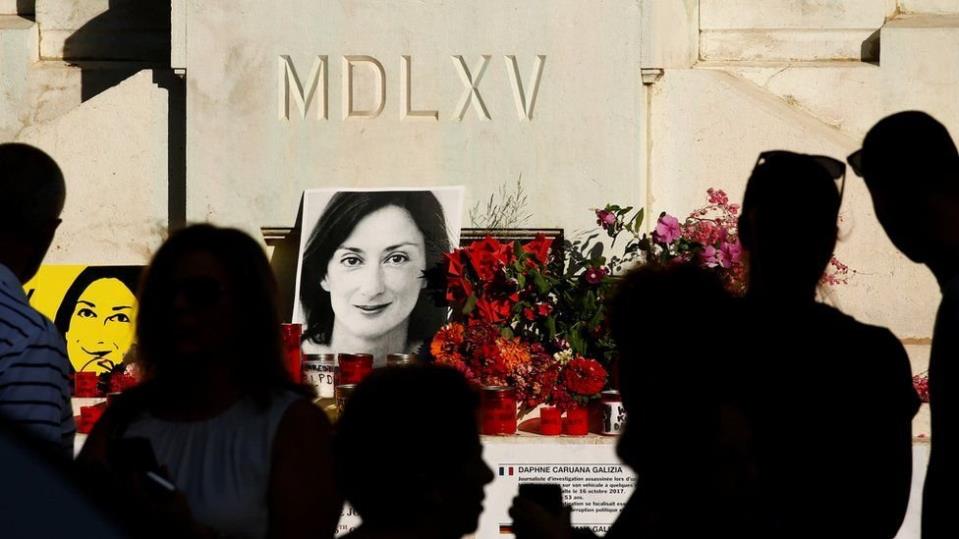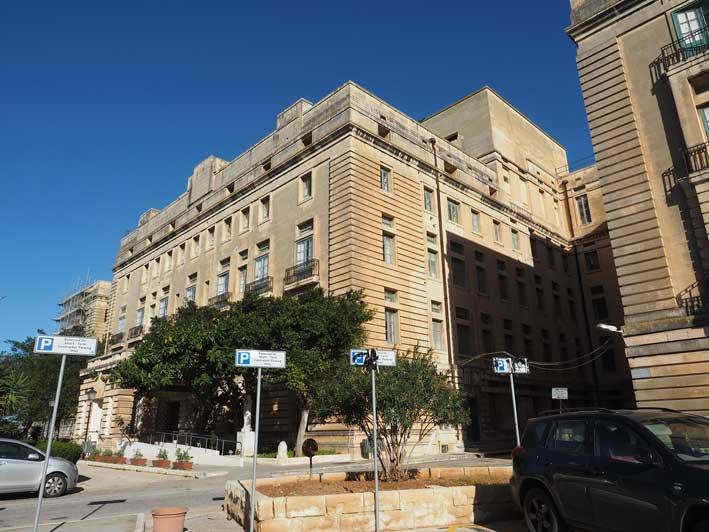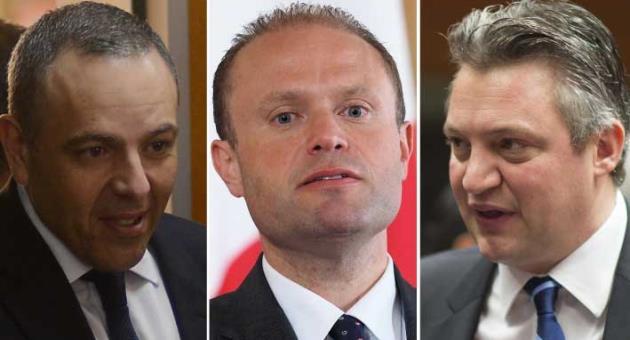On 9 March 2013, the Labour Party was elected into power after 15 years.
Under the leadership of the young and charismatic Joseph Muscat, the party had rebuilt itself into a political force which presented itself as an alternative to a Nationalist Party reeling from division and ideological conundrums.
A decade has now passed since Muscat’s landslide electoral victory – the first of three landslide general election victories which the Labour Party has stormed to.
Charting the achievements and pitfalls of Labour’s first 10 years in government however is far more complicated than one would think.
From the scandals to the economy, from civil liberties to Malta’s reputation, The Malta Independent on Sunday has broken the last decade down into 10 points which have defined Labour’s time in the driving seat.

1. The scandals of the Muscat era
Scarcely has there been an administration dominated by so many high-level scandals than that of Joseph Muscat.
Muscat was elected in 2013 on the promise of accountability, transparency and a no tolerance approach to corruption. Only days after the election, his chief of staff Keith Schembri and star Minister Konrad Mizzi started the process to open secret offshore companies in Panama.
The exposure of the Panama Papers in 2016 rocked the country, and was a scandal of such scale that it led to the calling of an early election in 2017.
But it wasn’t the only high-level scandal to have afflicted the Muscat administration: a few days ago we had the culmination of another one, when a court annulled the deal which the government signed with a company, which had absolutely no experience in the health sector, to hand them three state hospitals. The court pointed towards the deal having been fraudulent and that company Vitals Global Healthcare, and its successor, Steward Health Care, received between them €390 million in taxpayer money.
We also cannot forget the Electrogas power station. It has been mired in serious allegations, particularly for how the tender was awarded, while its CEO Yorgen Fenech – now accused of being a mastermind behind the murder of Daphne Caruana Galizia – was found to have a secret company in Dubai called 17 Black.
It was Fenech’s subsequent arrest in connection with the murder of Caruana Galizia – and the following resignation of Schembri – which was the death knell to Muscat’s administration.
People took to the streets day after day, and Muscat resigned in disgrace. From the Labour Party’s golden boy, he ended up being named as the 2019 “Person of the Year” for organised crime and corruption by a consortium of international journalists.
Robert Abela has had to deal with the blowback as more and more scandals from the Muscat administration are revealed and find their way to court. Abela has had his own fair share of bad headlines, but the scale and gravity of the grievances against his credibility on corruption, accountability and transparency is much lesser in nature than that of the Muscat administration.

2. Labour’s cornerstone: the economy
The economy has been the cornerstone of the justification for almost everything that Labour has done. That is perhaps with good reason: the last decade has seen significant improvements in the country’s economy.
Malta’s GDP has consistently increased among the higher (at times highest) rates in Europe, and Malta’s debt-to-GDP ratio has decreased – save for during the Covid-19 pandemic – quite significantly when compared to what it was in 2012.
This economic performance has allowed the government to introduce and sustain financial measures which are set out to help people: pensions have increased year-on-year, no new direct taxes have been introduced, energy bills have remained stable, public transport has been made free, free childcare has been introduced and a whole raft of financial grants and benefits have also been implemented.
The number of people who are considered as materially deprived stood at 10.2% of the population in 2014, but had dropped to 5.4% by 2021 according to European figures.
At the same time however, more people seem to be struggling: the at-risk-of-poverty rate has increased from 15.8% in 2014 to 16.9% in 2021, meaning that there are more people lagging behind others than before.
This can be put down to a number of factors: chief among those is that while life has generally become more expensive – particularly as of late owing to the inflation induced by the Ukraine War – wages haven’t increased enough to compensate for that.
Another factor, which is consistently mentioned, is as a consequence of a key part of Labour’s economic growth: an increase in population. Workers have come from far and wide to Malta to work in quickly-growing but low-paying industries which prop up the economy. Muscat and current Finance Minister Clyde Caruana have both justified it – with Muscat going as far as saying in 2019 that without foreign workers, the working public can wave goodbye to their pensions.
However the argument is that the presence of these workers has kept wages for everyone low and at the same time resulted in significant price hikes in the rental and property market.
It is a double-edged sword which, however, the Labour administration has seemed to – at least thus far – balanced well-enough.

3. Civil liberties: Malta becomes the rainbow island
If there is an area where the Labour Party has shone in the last decade, it is in the civil liberties sector. Elected after a widely polarising referendum – and political process which followed – to introduce divorce, the Labour government has introduced one new civil liberty after another.
Same-sex couples have gone from not even being able to visit each other as family members in hospital to being able to marry and adopt children like any other couple.
IVF has gone from a touchy ethical debate to not only being allowed, but also being supported by the government so that everyone can have a chance to have children.
Transgender people have gone from having to spend seven years (as in the case of one woman) to seek the right to marry their partner, to having gender identity added in the Constitution and to having the right to change their official documents through a simple affidavit.
Malta also became the first country to outlaw sterilisation and invasive surgery on intersex people in 2015, and also became the first country in the European Union to ban conversion therapy.
It is little wonder given the above, and all to Labour’s credit, that Malta has topped the European rankings for LGBT rights legislation across Europe since 2015.
The country has also become one of the first to legalise the use of medical cannabis and then legalise cannabis for recreational use, although the implementation of the latter point from a regulatory standpoint has not been done as well as it should have and the impact such a law may have on society in general is thus far unclear.
The latest civil liberties topic is, in many ways, something which can be considered as the final frontier which Malta has to face: abortion.
Abela’s proposed amendment to abortion laws to allow doctors to terminate a pregnancy when the mother’s health is in grave danger has stoked praise from some and outrage from others. Changes to the draft law are in the pipeline, but it remains to be seen how the matter will go down and whether, from a popularity standpoint, this will be a bridge too far for the Labour Party.

4. Daphne Caruana Galizia: The journalist who raised a storm and was murdered under Labour’s watch
The name Daphne Caruana Galizia and her legacy are indelibly tied to the way in which the Labour government’s first decade will be remembered.
It was Caruana Galizia who exposed the most rotten scandals within the ranks of the Muscat administration and it was under Labour’s watch that she was assassinated in a car bombing in October 2017.
A public inquiry (which the government had to be pressured into appointing) later found that the State was responsible for creating an environment and culture of impunity which allowed the murder to take place, throwing Malta into the international spotlight again.
There is no hiding from the fact that the Labour Party’s demonisation of Daphne played a key part in the creation of the environment where someone can contemplate blowing up a journalist in a car bomb.
That Daphne was murdered because of her stories is of no doubt: besides what she had already reported, she had just started to hint at the scandal relating to 17 Black, which was eventually fully revealed after her death.
Even today, Daphne’s words still hold their weight. One by one, her stories have proven to be true. The latest were her stories on the Vitals concession.
Daphne was right on many things, and that’s something which Labour will never be able to escape from.

5. Major projects – Major failures
In the last 10 years, the Labour government has embarked on a number of keynote, major projects. But looking back now, practically all of those have been mired in allegations of corruption or have simply not been a success.
The Electrogas power station for starters may have been a keynote project for the energy sector, but there are still questions over how effective it has been, given that Malta continues to rely on the interconnector quite substantially.
The deal to hand three state hospitals to Vitals Global Healthcare – which was later taken over by Steward Health Care – has crashed and burned in the most public of fashions in the last few days, with practically nothing to show for it after eight years. The most notable thing to show for the deal is the €390 million hole it left in the government’s wallet.
The government’s keynote educational project, the American University of Malta, was mired in controversy from the start over accreditation issues and staff sackings. While AUM’s presence has seen the regeneration of the Cospicua dock area, the project cannot be realistically considered a success.
Even the Labour Party’s keynote €700 million investment in the country’s roads, which has seen the improvement of a number of major and residential roads in the last years, has been tainted by corruption allegations. This is as the European Public Prosecutor's Office is investigating the Marsa Junction flyover project in connection with fraud and corruption allegations.
It’s clear that most of these major projects have been, in the grand scheme of things, major failures.

6. Malta’s reputation: Tarnished or intact?
Looking back at the last 10 years, it’s quite easy to find occasions when government actions or decisions have indeed resulted in less than glowing praise from abroad.
The murder of Caruana Galizia brought scrutiny and criticism. The government’s controversial golden passport scheme drew – and continues to draw – ire from Europe and has landed Malta in hot water in the form of infringement proceedings.
Delegations from the Venice Commission, GRECO and the OSCE came to Malta and left with criticism on certain rule of law aspects in the country, although again the government can be credited with taking action to implement a good chunk of the feedback including some important reforms such as on the appointment on the judiciary, the police commissioner and the President.
The country’s greylisting by the Financial Action Task Force put a significant black mark on Malta as a centre for the financial services industry, with the government managing to do just enough to get off the greylist in the space of 12 months.
At the same time, Malta has taken centre stage in a good way on some occasions. Malta’s EU Presidency in 2017 prompted praise: Politico for instance gave the country a 10/10 for how it kept the EU27 together in the bloc’s response to the start of formal Brexit proceedings and another 10/10 in successfully closing of decade-long agreements on the topic of fisheries.
Likewise, last month Malta held the presidency of the United Nations Security Council, having the task of leading discussions on the one-year anniversary of Russia’s invasion of Ukraine. The team in New York representing Malta handled this sensitive topic well and in line with the values that the country has.
Malta’s strong handling of the Covid-19 pandemic also drew praise from European and global authorities, that used Malta as a case study and good example for many other countries to follow.
But still, while Malta’s reputation abroad has not descended to the point of some other European countries, such as Hungary for instance, on the whole there has probably been more damage done than improvements registered.

7. Labour’s energy roadmap loses its way
The Labour Party’s energy roadmap had the building of a new power station in partnership with the private sector and reducing Malta’s electricity bills by 25% at the centre of its 2013 general election manifesto.
Cooked up by Konrad Mizzi and Keith Schembri – then both relative unknowns – the plan seemed to come to fruition: the polluting heavy fuel oil power station was shut down, Malta did get a new gas-fired power station – albeit later than originally promised – and electricity bills were indeed reduced.
But beneath that façade, the picture is not as rosy. The National Audit Office found various shortcomings in the selection and evaluation process which saw Electrogas be picked to operate the power station, and that the energy generated by the new facility was actually more expensive than the Malta-Sicily interconnector, leading to people being overcharged.
It was further mired in financial issues: one of the power station partners, Gasol, dropped from the partnership in 2015 after facing money troubles, and BOV also inexplicably granted a huge loan to the company against a State guarantee.
There have also been doubts raised recently over how effective the power station has been. This has been prompted by widespread power cuts which happened after the interconnector was damaged, and also more recently by a nationwide power cut when the interconnector tripped as the LNG tanker, which supplies the power station, had to be moved out offshore.
In the midst of all of this, the government’s renewable energy direction could also have been better. While Malta’s share of renewable energy has increased year-on-year, it has been slow, with Malta having to buy €2 million in energy credits from Estonia in order to reach its European renewable energy targets, which were set at the lowest they could be set, (10%) for 2020.

8. An environment on the backburner
Malta’s environment over the past decade has deteriorated. There is no doubt whatsoever in that regard.
Rather than stopping the environmental decline, the Labour government has in many ways encouraged it. A total of 76,407 new dwellings were approved by the Planning Authority between 2013 and 2022 – with 50,302 coming between 2018 and 2022. That’s an increase of 8,732 new dwellings when compared to the amount approved between 2003 and 2013.
These developments have contributed to what many have probably rightly perceived to be the uglification of Malta. More and more streetscapes across the islands have been ruined and ravaged by modern apartment blocks, rising like a proverbial middle finger to the uniform houses around it.
The government has done very little to try and stem the tide for this, preferring to blame the changes made to the local plans by the PN in 2006 when it can. But after 10 years in government and 17 years since the local plans were published, using them as an excuse is tenuous at best.
Other policies have prompted an increase in high-rises, which isn’t necessarily a bad thing, but there is no holistic master plan for how this should be done, while things like the later amended fuel station policy proved to be a bad idea from the get-go.
The government did itself no favours in projects it led itself, with a number of infrastructural projects particularly drawing ire from environmentalists for the amount of farmland which they took up and the amount of trees which were chopped as a result.
Related to this, the perception of many has been that developers and the construction industry have gotten a free pass to “make hay while the sun shines” – as MDA president Sandro Chetcuti had famously put it.
It took the collapse of people’s homes in separate incidents, including one which proved to be fatal, to prompt the government to take action and change laws to promote higher standards in the construction industry and to give more protection to those living around construction sites.
And yet it took another death – that of Jean Paul Sofia last December – for the government to finally come up with licensing standards for building contractors.
All this – coupled with a total lack of faith in planning institutions and in the institutions supposed to be enforcing the construction industry – has led to a people with little to no faith in the government’s environmental credibility.
Robert Abela’s €700 million environmental investment pledge is a good start to try and alleviate this lack of faith, but the proof of the pudding will be in the eating.

9. The handling of the Covid-19 pandemic
It can be said that the Covid-19 pandemic has been – along with the 2008 financial crisis and the Ukraine War – the crisis which so far has defined the 21st century as a whole. And while much of Europe flip-flopped and floundered, it has to be said that the Labour administration’s handling of the crisis was among the best.
This is not to say that there weren’t mistakes, but the fact that the government’s leadership could keep the number of deaths to a relatively low number when compared to other countries and at the same time take the necessary steps to keep the economy alive is a credit to them.
Further credit must be granted for the government’s roll-out of the Covid-19 vaccine. The work to obtain the vaccines as early as possible and the efficiency in which the roll-out of the vaccine was handled was more akin to stereotypical German efficiency than to stereotypical Mediterranean efficiency.
From an economic perspective, while unemployment increased, it did not skyrocket like it did in other countries – mainly owing to the government’s wage supplement scheme which kept businesses afloat and people in their jobs. Even then, employment levels soon came back to what they were before the pandemic and then got even better.
On the whole, the government’s pandemic management can be judged as having been a success.

10. The rise of civil society
Civil society was something which was very much case-by-case in Malta. Crowds and activists mobilised for votes on specific subjects, but by and large there were few demonstrations taking to Malta’s streets to demand change to something.
That changed when Caruana Galizia was murdered in 2017. Suddenly a renewed civil society movement was born. People blamed the inaction in investigating what Daphne had reported. Protests started being held regularly. People were camping outside the Prime Minister’s office. Authority was defied every day to set up a memorial to the murdered journalist.
Then the movement spread. More and more people and NGOs started to find their voices on the subjects which they felt mattered. Suddenly, Malta’s civil society movement began to thrive.
And when it did begin to thrive, the government was forced to start to listen. Action by members of civil society – be them organised groups or even groups of residents – have resulted in the government introducing new policies or backtracking on decisions that it had taken.
Examples of this include the government’s backtracking on the fuel stations policy, the government finally caving in to pressure to appoint a public inquiry into Caruana Galizia’s death and the government’s withdrawal of plans for a yacht marina in Marsascala.
Hundreds marched in the streets to call for changes to construction laws after three houses collapsed into construction sites in the space of a few months, prompting improvements to legal frameworks around the industry.
Civil society action saw things like the much-opposed permit for the db project in Pembroke to be taken to court and be revoked.
Most obviously, it was the people taking to the streets in their thousands in 2019 which ultimately led Joseph Muscat to announce his resignation from Prime Minister – just two-and-a-half years after winning power with another super majority.
The fact is that in the last decade the people have found their voice, and that’s something that Labour – and quite possibly any government – is going to have to contend with in the present and future.